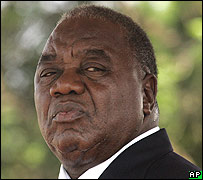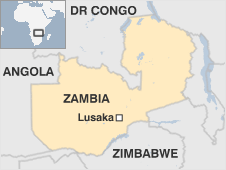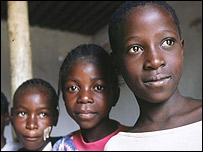Zambia has moved from being a major copper producer and potentially one of the continent's richest countries at independence in 1964 to one of the world's poorest.
A colonial legacy mismanagement debt and disease are said to have contributed to the country's tribulations.
Politically it switched from colonial government into an era of one-party rule lasting 27 years. A multi-party system emerged in the early 1990s.
Overview
Zambia is landlocked and sparsely populated by more than 70 ethnic groups many of them Bantu-speaking. It has some spectacular scenery including the Victoria Falls along the Zambezi river the Bangweulu Swamps and the Luangwa river valley.
 |
AT-A-GLANCE
Politics: The late president Levy Mwanawasa won respect for his anti-corruption drive
Economy: Improved copper prices and investment in mining have improved prospects for export earnings
International: Thousands of refugees from the Angolan civil war have yet to return home
|
In the late 1960s it was the third largest copper miner after the US and the Soviet Union. World copper prices collapsed in 1975 with devastating effects on the economy.
The World Bank has urged Zambia to develop other sources of revenue - including tourism and agriculture. Even so copper accounts for most of Zambia's foreign earnings and there is optimism about the future of the industry which was privatised in the 1990s. Electronics manufacturers have fuelled demand and investment in mines has grown.
Aids is blamed for decimating the cream of Zambian professionals - including engineers and politicians - and malaria is a major problem. Millions of Zambians live below the World Bank poverty threshold of $1 a day.
Zambia hosts tens of thousands of refugees who have fled fighting in the Democratic Republic of Congo.
Facts
- Full name: Republic of Zambia
- Population: 12.9 million (UN 2009)
- Capital: Lusaka
- Area: 752614 sq km (290586 sq miles)
- Major language: English (official) Bemba Lozi Nyanja Tonga
- Major religions: Christianity indigenous beliefs Hinduism Islam
- Life expectancy: 45 years (men) 46 years (women) (UN)
- Monetary unit: 1 Kwacha = 100 ngwee
- Main exports: Copper minerals tobacco
- GNI per capita: US $950 (World Bank 2008)
- Internet domain: .zm
- International dialling code: +260
Leaders
President: Rupiah Banda
Mr Banda became president with a narrow victory in elections called on October 2008 after the death of President Levy Mwanawasa.

President Banda's election was hotly contested
|
His opponent the charismatic main opposition candidate Michael Sata alleged that the vote had been rigged and demanded a recount.
Official results declared Mr Banda the winner with 40% of the vote to Mr Sata's 38%.
A career diplomat with a
relatively low political profile Mr Banda was picked by Mr Mwanawasa as his vice-president in 2006 before stepping in as acting head of state upon the president's death.
During the election he campaigned as a man of the people having previously been known as the country's most prominent sports fan.
Splits emerged within Mr Banda's governing Movement for Multiparty Democracy or MMD in October 2009. Mr Banda's rivals within the MMD rejected calls by his supporters not to hold the usual convention and select Mr Banda as the sole candidate for the 2011 presidential election.
Born in 1937 in Zimbabwe where
his parents had gone to find work Mr Banda returned to Zambia for his schooling before going to university in Ethiopia and Sweden.
Under Zambia's first president Kenneth Kaunda he served as foreign minister and minister of mines.
Mr Banda's predecessor Levy Mwanawasa became president after a narrow election win in 2001.
Mr Mwanawasa made the fight against corruption a centrepiece of his presidency.
Western donors praised him for boosting economic growth to above 5% cutting Zambia's foreign debt and attracting foreign investments helped by his anti-graft campaign.
Media
State-run radio and television services dominate Zambia's broadcasting scene. Private radio stations offer little political reporting.
The authorities make use of several laws including libel and security laws to intimidate journalists especially those who have reported on corruption. Defaming the president is a criminal offence.
FM relays of BBC World Service and Radio France Internationale are on the air in Lusaka and Kitwe. Multichannel pay-TV services are available.
The press
Television
Radio
- Zambia National Broadcasting Corporation (ZNBC) - state-run radio operates three services; multilingual Radio 1 and English-language Radio 2 and Radio 4
- QFM - private Lusaka music station
- Radio Phoenix - private
- Radio Icengelo - church-owned
- Breeze FM - private station in Chipata
- Yatsani Radio - Catholic station
- Radio Choice - private station in Lusaka
News agency




